高中直接引语和间接引语详解与习题
直接引语和间接引语用法及练习(含答案)
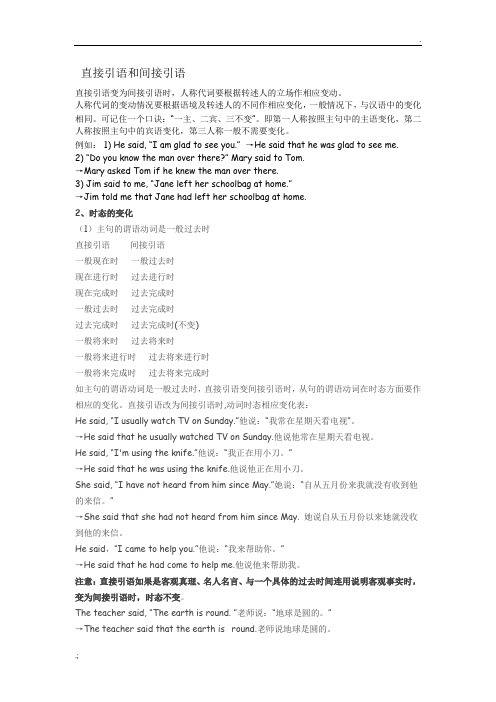
直接引语和间接引语直接引语变为间接引语时,人称代词要根据转述人的立场作相应变动。
人称代词的变动情况要根据语境及转述人的不同作相应变化,一般情况下,与汉语中的变化相同。
可记住一个口诀:“一主、二宾、三不变”。
即第一人称按照主句中的主语变化,第二人称按照主句中的宾语变化,第三人称一般不需要变化。
例如: 1) He said, “I am glad to see you.”→He said that he was glad to see me. 2) “Do you know the man over there?” Mary said to Tom.→Mary asked Tom if he knew the man over there.3) Jim said to me, “Jane left her schoolbag at home.”→Jim told me that Jane had left her schoolbag at home.2、时态的变化(1)主句的谓语动词是一般过去时直接引语间接引语一般现在时一般过去时现在进行时过去进行时现在完成时过去完成时一般过去时过去完成时过去完成时过去完成时(不变)一般将来时过去将来时一般将来进行时过去将来进行时一般将来完成时过去将来完成时如主句的谓语动词是一般过去时,直接引语变间接引语时,从句的谓语动词在时态方面要作相应的变化。
直接引语改为间接引语时,动词时态相应变化表:He said, “I usually watch TV on Sunday.”他说:“我常在星期天看电视”。
→He said that he usually watched TV on Sunday.他说他常在星期天看电视。
He said, “I'm using the knife.”他说:“我正在用小刀。
”→He said that he was using the knife.他说他正在用小刀。
直接引语与间接引语相互转换的方法指导及练习题
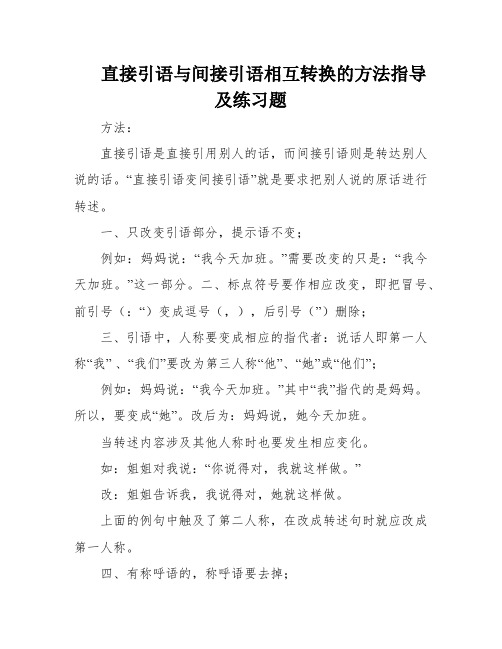
直接引语与间接引语相互转换的方法指导及练习题方法:直接引语是直接引用别人的话,而间接引语则是转达别人说的话。
“直接引语变间接引语”就是要求把别人说的原话进行转述。
一、只改变引语部分,提示语不变;例如:妈妈说:“我今天加班。
”需要改变的只是:“我今天加班。
”这一部分。
二、标点符号要作相应改变,即把冒号、前引号(:“)变成逗号(,),后引号(”)删除;三、引语中,人称要变成相应的指代者:说话人即第一人称“我” 、“我们”要改为第三人称“他”、“她”或“他们”;例如:妈妈说:“我今天加班。
”其中“我”指代的是妈妈。
所以,要变成“她”。
改后为:妈妈说,她今天加班。
当转述内容涉及其他人称时也要发生相应变化。
如:姐姐对我说:“你说得对,我就这样做。
”改:姐姐告诉我,我说得对,她就这样做。
上面的例句中触及了第二人称,在改成转述句时就应改成第一人称。
四、有称呼语的,称呼语要去掉;例如:老红军说:“小鬼,你骑上我的马吧!”个中,“小鬼”要删除。
变后为:老红军说,小鬼骑上他的马吧!5、引语是疑问句的,要变成XXX的语气。
例如:明明问我:“本日下学后,到我家写作业,行吗?”变后为:明明问我,本日下学后,到他家写作业,行不行。
六、直接引语改成直接引语的办法恰好相反,上面的五点都合用,如第三人称“他”或“她”应改成第一人称“我”,语言内容触及第一人称应改成第二人称。
如:1.XXX对XXX说,他明天把钢笔还给XXX。
2.妹妹通知爸爸,哥哥说他早晨有事不返来吃饭了。
3.老师对XXX说,她的表现最出色。
4.老班长告诉我们,他没有完成任务,没把我们照顾好。
练题一:把直接引语变成间接引语。
1.老师对我说:“我教你毛笔字的写法。
”2.梅花兴奋地说:“我是中国人,我怎么能忘掉故国的语言呢?”3.他站起来对大家说:“孩子们,我要去开会了。
你们要听话。
”4.奶奶问我:“今天我还给你送饭吗?”5.妈妈说:“XXX,今晚我加班,你自己做饭吃!”6.XXX对XXX说:“你借给我二十条船,我自有妙用。
高中直接引语和间接引语转化详解(含习题及答案)

直接引语和间接引语转化详解引用别人的话有两种方式,一种是讲述别人的原话,并把它放在引号里,这叫直接引语;另一种是用自己的话来转述别人,并且不能用引号,这就是间接引语。
直接引语和间接引语之间可以互相转换。
扩展1、直接引语如果表示客观真理,变间接引语时,时态不变。
2、直接引语若有明确的表示时间的词语,变间接引语时,时态不变。
3、若直接引语中含有c o u l d,m u s t,s h o u l d等情态动词,变间接引语时,时态不变。
4、直接引述别人的原话,叫直接引语。
5、用自己的话转述别人的话,叫间接引语。
直接引语变间接引语的五点变化1.时态变化直接引语变为间接引语时,若主句为过去时态,变为宾语从句的时态如下表:"l l i k e E n g l i s h v e r y m u c h,"h e s a i d.他说:“我很喜欢英语。
”→H e s a i d t h a t h e l i k e d E n g l i s h v e r y m u c h.H e s a i d,"I t w i l l r a i n s o o n."他说:“很快就会下雨。
”→H e s a i d t h a t i t w o u l d r a i n s o o n.注意:[1]若直接引语为客观真理,则变为间接引语时时态不变:T h e t e a c h e r s a i d t o u s,"K n o w l e d g e i s p o w e r."老师对我们说:“知识就是力量”→T h e t e a c h e r t o l d u s t h a t k n o w l e d g e i s p o w e r.[2]有时由于直接引语有特定的过去时态状语,变为间接引语时时态也可不变:H e s a i d,”M y d a u g h t e r w a s b o r n i n1997."他说:“我的女儿是1997年出生的。
直接引语与间接引语讲解与练习题
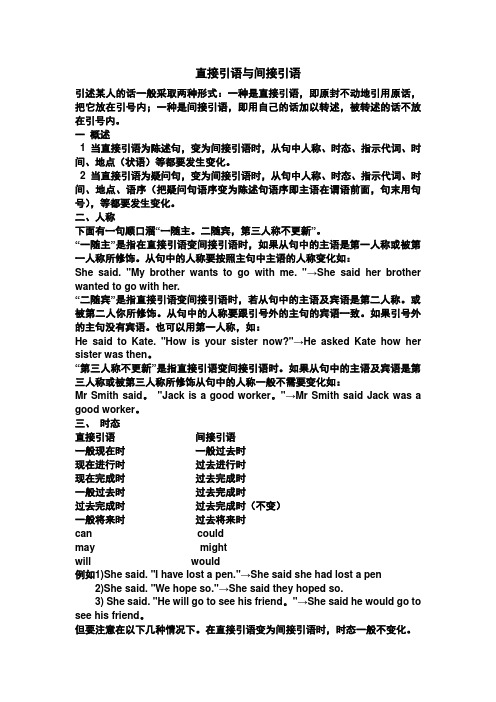
直接引语与间接引语引述某人的话一般采取两种形式:一种是直接引语,即原封不动地引用原话,把它放在引号内;一种是间接引语,即用自己的话加以转述,被转述的话不放在引号内。
一概述1 当直接引语为陈述句,变为间接引语时,从句中人称、时态、指示代词、时间、地点(状语)等都要发生变化。
2 当直接引语为疑问句,变为间接引语时,从句中人称、时态、指示代词、时间、地点、语序(把疑问句语序变为陈述句语序即主语在谓语前面,句末用句号),等都要发生变化。
二、人称下面有一句顺口溜“一随主。
二随宾,第三人称不更新”。
“一随主”是指在直接引语变间接引语时,如果从句中的主语是第一人称或被第一人称所修饰。
从句中的人称要按照主句中主语的人称变化如:She said. "My brother wants to go with me. "→She said her brother wanted to go with her.“二随宾”是指直接引语变间接引语时,若从句中的主语及宾语是第二人称。
或被第二人你所修饰。
从句中的人称要跟引号外的主句的宾语一致。
如果引号外的主句没有宾语。
也可以用第一人称,如:He said to Kate. "How is your sister now?"→He asked Kate how her sister was then。
“第三人称不更新”是指直接引语变间接引语时。
如果从句中的主语及宾语是第三人称或被第三人称所修饰从句中的人称一般不需要变化如:Mr Smith said。
"Jack is a good worker。
"→Mr Smith said Jack was a good worker。
三、时态直接引语间接引语一般现在时一般过去时现在进行时过去进行时现在完成时过去完成时一般过去时过去完成时过去完成时过去完成时(不变)一般将来时过去将来时can couldmay mightwill would例如1)She said. "I have lost a pen."→She said she had lost a pen2)She said. "We hope so."→She said they hoped so.3) She said. "He will go to see his friend。
直接引语变间接引语(宾语从句)讲解与练习(附答案)
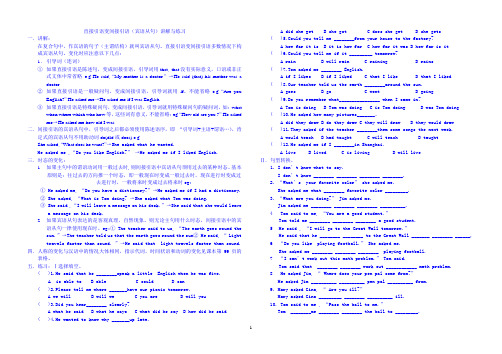
直接引语变间接引语(宾语从句)讲解与练习一.讲解:在复合句中,作宾语的句子(主谓结构)就叫宾语从句。
直接引语变间接引语多数情况下构成宾语从句。
变化时应注意以下几点:1.引导词(连词)①如果直接引语是陈述句,变成间接引语,引导词用that, that没有实际意义,口语或非正式文体中常省略e.g He said, “My mother is a doctor.”→He said (that) his mother was adoctor.②如果直接引语是一般疑问句,变成间接引语,引导词就用if。
不能省略 e.g “Are youEnglish?” He asked m e→He asked me if I was English.③如果直接引语是特殊疑问句,变成间接引语,引导词就用特殊疑问句的疑问词,如:whatwhen where which who how等,这些词有意义,不能省略:eg “How old are you ?” He askedm e→He asked me how old I was.二.间接引语的宾语从句中,引导词之后都必须使用陈述语序,即“引导词+主语+谓语…),肯定式的宾语从句不用助动词do(did或does) e.g.She asked, “What does he want?”→She asked what he wanted.He asked me ,“Do you like English?”→He asked me if I liked English.三.时态的变化:1.如果主句中的谓语动词用一般过去时,则间接引语中宾语从句须用过去的某种时态。
基本原则是:往过去的方向推一个时态,即一般现在时变成一般过去时,现在进行时变成过去进行时,一般将来时变成过去将来时eg:① He asked me, “Do you have a dictionary?”→He asked me if I had a dictionary.② She asked, “What is Tom doing? →She asked what Tom was doing.③ She said ,“I will leave a message on his desk.”→She said that she would leavea message on his desk.2.如果宾语从句表达的是客观真理,自然现象。
高一英语必修一直接引语间接引语综合练习 参考答案

高一英语必修一直接引语和间接引语(3)综合练习Name:_______________ Tel:_______________Part 1:核心知识点总结Part 2:综合练习一.将下列句子变为间接引语1.Mr.Wang said,“I will leave for Shanghai on business next month, children.”_________________________________________________________________2.“I haven't heard from my parents these days,”said Mary._________________________________________________________________ 3.She said,“Light travels much faster than sound.”_________________________________________________________________ 4.Zhang Hong said to me,“Doctor Wang passed away in 1948.”_________________________________________________________________ 5.“What's wrong with you, Granny?”the doctor asked._________________________________________________________________ 6.“Have you got anything interesting I can read,George?”she ask ed._________________________________________________________________ 7.“She's here to ask for help, isn't she?”he asked._________________________________________________________________ 8.“Where are you going?”the father asked his son._________________________________________________________________ 9.The teacher said to Li Ming,“Have you finished your homework?”_________________________________________________________________ 10.He said,“I was driving carefully when the accident happened.”_________________________________________________________________ 参考答案:1. Mr. Wang told the children that he would leave for Shanghai on business the next month.2. Mary said that she hadn't heard from her parents those days.3. She said that light travels much faster than sound.4. Zhang Hong told me that Doctor Wang passed away in 1948.5. The doctor asked Granny what was wrong with her.6. She asked George if he had got anything interesting she could read.7. He asked whether she was there to ask for help or not.8. The father asked his son where he was going.9. The teacher asked Li Ming if he had finished his homework.10. He said (that) he had been driving carefully when the accident happened.11.Mary asked me,“Did you take part in Anne's party last Saturd ay?”_________________________________________________________________ 12.Miss Smith said to us,“Correct the mistakes yourselves.”_________________________________________________________________ 13.The teacher said to me,“Clean the blackboard after class.”_________________________________________________________________ 14.He said,“Most of the students show great interest in the painting.”_________________________________________________________________ 15.Mother said to Tom,“What are you doing in the r oom?”_________________________________________________________________ 16.The policeman asked me,“Where was it that you lost your key to the classroom?”_________________________________________________________________ 17.I said to Mum,“I have already learned about 2,000 English words.”_________________________________________________________________ 18.The girl asked Tom,“Do you think a diary can become your friend?”_________________________________________________________________ 19.My brother said,“There is going to be an English film tomorrow evening.”_________________________________________________________________ 20.He said to me,“I was here to see my brother.”_________________________________________________________________ 参考答案:11.答案:Mary asked me if/whether I had taken part in Anne's party the Saturday before.12.答案:Miss Smith asked/ordered us to correct the mistakes ourselves. 13.答案:The teacher told/asked me to clean the blackboard after class.14.答案:He said (that) most of the students showed great interest in the painting.15.答案:Mother asked Tom what he was doing in the room.16.答案:The policeman asked me where it was that I had lost my key to the classroom.17.答案:I told Mum that I had already learned about 2,000 English words.18.答案:The girl asked Tom if/whether he thought a diary could become his friend.19.答案:My brother said there was going to be an English film the next evening.20.答案:He told me he had been there to see his brother.二.用括号内动词的适当形式填空1.My father asked me if I ________(finish) my homework before I played basketballwith my friends.2.Peter said he ________(listen) to music when his mother knocked on the door. 3.My teacher told us that practice ________(make) perfect.4.It was reported that a new square ________(build) in our city the next year. 5.Linda said that her car ________(break) down on her way home the other day. 6.Our teacher told us that he ________(give) an examination the next Friday. 7.He asked me if I ________(have) any difficulty with my English.8.Tim told his classmates that he ________(be) to the Forbidden City three times. 参考答案:1.had finished 2.was listening 3.makes 4.would be built 5.broke 6.would give7.had8.had been三.单句改错:下列各句均有一处错误,请找出并改正1.The teacher told the students that they will have a picnic.2.Barbara asked her friend don't worry about the result of the exam.3.The policeman asked the old man where was his home.4.Mother told me that she bought a computer for me the day before.5.The leader ordered us not give up our dream of being free.参考答案:1.will→would 2.don't→not to 3.was his home→his home was 4.bought前加had 5.not后加to。
直接引语与间接引语(带问题详解)
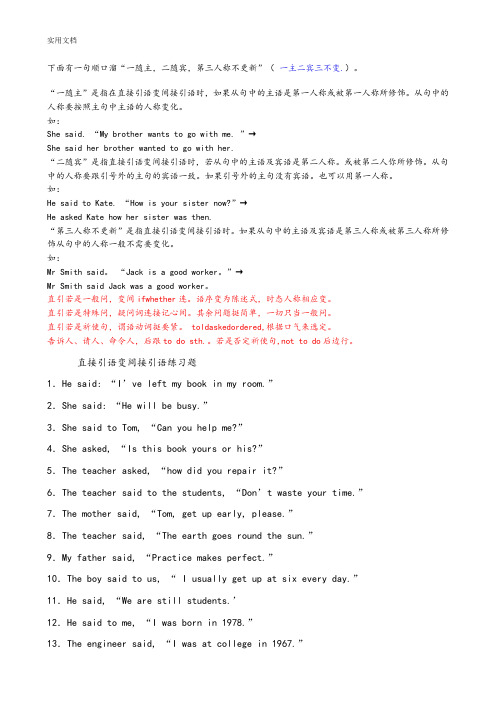
下面有一句顺口溜“一随主,二随宾,第三人称不更新”(一主二宾三不变.)。
“一随主”是指在直接引语变间接引语时,如果从句中的主语是第一人称或被第一人称所修饰。
从句中的人称要按照主句中主语的人称变化。
如:She said. “My brother wants to go with me. ”→She said her brother wanted to go with her.“二随宾”是指直接引语变间接引语时,若从句中的主语及宾语是第二人称。
或被第二人你所修饰。
从句中的人称要跟引号外的主句的宾语一致。
如果引号外的主句没有宾语。
也可以用第一人称。
如:He said to Kate. “How is your sister now?”→He asked Kate how her sister was then.“第三人称不更新”是指直接引语变间接引语时。
如果从句中的主语及宾语是第三人称或被第三人称所修饰从句中的人称一般不需要变化。
如:Mr Smith said。
“Jack is a good worker。
”→Mr Smith said Jack was a good worker。
直引若是一般问,变间ifwhether连。
语序变为陈述式,时态人称相应变。
直引若是特殊问,疑问词连接记心间。
其余问题挺简单,一切只当一般问。
直引若是祈使句,谓语动词挺要紧。
toldaskedordered,根据口气来选定。
告诉人、请人、命令人,后跟to do sth.。
若是否定祈使句,not to do后边行。
直接引语变间接引语练习题1.He said: “I’ve left my book in my room.”2.She said: “He will be busy.”3.She said to Tom, “Can you help me?”4.She asked, “Is this book yours or his?”5.The teacher asked, “how did you repair it?”6.The teacher said to the students, “Don’t waste your time.”7.The mother said, “Tom, get up early, please.”8.The teacher said, “The earth goes round the sun.”9.My father said, “Practice makes perfect.”10.The boy said to us, “ I usually get up at six every day.”11.He said, “We are still students.’12.He said to me, “I was born in 1978.”13.The engineer said, “I was at college in 1967.”14.He said, “I have studied English since I was a boy.”15.She said, “I read the book while I was waiting for a bus.16.Mr. Green said to them, “Joe told me all about his story when he asked for a job.”17.He said, “We insisted that she start immediately.18.She said, “He demanded that the girl leave at once.”19.I said to him, “I have finished it.”20.She said to us,“ I’ll come here tomorrow.”21.“Where does your chemistry teacher live, Karen?” the young man asked.22.“I have gained the first place in the mathematics competition,” the little boy said happily.23.“Light travels faster than sound,” the physics teacher said to the boys and girls.24.“Will you go to the concert with me this evening?” Mary asked me.25.“What did you do here yesterday?” the old man asked my brother.直接引语变间接引语专练题(二)Ⅰ.单项选择1. He asked ________ for the computer.A. did I pay how muchB. I paid how muchC. how much did I payD. how much I paid2. “Have you seen the film?” he asked me. →He asked me _______.A. had I seen the filmB. have I seen the filmC. if I have seen the filmD. whether I had seen the film3. “Please close the window,” he said to me.→He ______ me _____ the window.A. said to; to closeB. told to; closingC. asked ; to closeD. said to; please close4. “I am a teacher,” Jack said. →He said _________.A. that I am a teacherB. I was a teacherC. that he is a teacherD. he was a teacher5. He said, “Mother, the boy is very naughty.”→He _____- very naughty.A. said his mother that the boy wasB. said to his mother that the boy isC. told his mother that the boy wasD. spoke to his mother that the boy was6. “You’ve already got well, haven’t you?” she asked.→She asked ________.A. if I have already got well, hadn’t youB. whether I had already got wellC. have I already got wellD. had I already got well.7. He asked , “ Are you a Party member or a League member?”→He asked me _________.A. am I a Party member or a League memberB. was I a Party member or a League memberC. if I was a Party member or a League memberD. whether was I a Party member or a League member.8. He asked, “How are you getting along?”→He asked _______.A. how am I getting alongB. how are you getting alongC. how I was getting alongD. how was I getting along9. He asked me ________ with me.A. what the matter isB. what the mater wasC. what’s the matterD. what was the matter10. He said, “Don’t do that again.” He _____ me _______ that again.A. said to me; not to doB. said to me; don’t doC. told me; don’t doD. told me; not to do附答案:1. He told me that he had left his book in his room.2. She said that he would be busy.3. She asked Tom if /whether he could help her.4. She asked me whether that book was mine or his.5. The teacher asked me how I had repaired it.6. The teacher told the students not to waste their time.7. The mother asked Tom to get up early.8. The teacher said that the earth goes round the sun.9. My father said practice makes perfect.10. The boy told us he usually gets up at six every day.11. He said they are still students.12. He told me that he was born in 1978.13. The engineer said he was at college in 1967.14. He said he had studied English since he was a boy.15. She said she had read the book while she was waiting for a bus.16. Mr. Green told them Joe had told him all about his story when he asked for a job.17. He said they (had) insisted that she start immediately.18. She said he demanded that the girl leave at once.19. I told him I had finished it.20. She told us she would come here tomorrow21. The young man asked Karen where her chemistry teacher lived.22. The little boy said happily that he had gained the first place in the mathematics competition.23. The physics teacher told the boys and girls that light travels faster than sound.24. Mary asked me if / whether I would go to the concert with her that evening. 25. The old man asked my brother what he had done there the day before.答案与简析:1. D 宾语从句要用陈述句语序。
高中直接引语和间接引语详解和习题

直接引语和间接引语详解与习题一、直接引语和间接引语的定义1. 直接引语:别人直接说的话,一般直接放在引号内。
如:(1) My mother told me, “You should finish your homework first, then you can play with your friends.”(2) Our teacher said, “Class is over, we should have a rest.”2. 间接引语:用自己的话加以转述,被转述的话不放在引号内。
上面两个例句变成间接引语应该是:(1) My mother told me that I should finish my homework first and then I could go out and play with my friends.(2) Our teacher said class was over and we should have a rest.二、直接引语与间接引语的变化直接引语变成间接引语时,由于引述动词(said, told等)一般都是过去时形式,因此间接引语中的动词时态、人称代词、限定词、时间状语、地点状语等一般都要做相应的变化。
有下面几种情况:1. 现在时间推移到过去时间所谓现在时间推移到过去时间指一般现在时变为一般过去时,现在进行时变成过去进行时,现在完成时变成过去完成时。
例如:She said, “I am hungry.” T She said (that) she was hungry.Vince said, “I have found what,s wrong with the computer.” T Vince said he had found what was wrong with the computer.在下列场合,尽管陈述动词为过去时形式,间接引语中的动词时态却不必改变,即:(1)当引述的是客观事实、科学真理、现在习惯工作以及格言等内容时:He said, “The word 'laser, is an acronym首字母缩略词).” T He said the word 'laser,is an acronym.(2)当动词所表示的状态或动作在引述时仍在继续时:“I,m forty,” he said. t He said he is forty.(3)当谓语动词包含无过去时形式的情态助动词时:He said, “It must be pretty late. I really must go.” — He said it must be pretty late, and he really must go.He said, “You mustn’t smoke in the room.”—He said I mustn’t smoke in the room. 2. 过去时间推移到过去的过去这里需要注意以下几点:(1)当强调动作或状态先于引述动词时,一般过去时要变成过去完成体。
- 1、下载文档前请自行甄别文档内容的完整性,平台不提供额外的编辑、内容补充、找答案等附加服务。
- 2、"仅部分预览"的文档,不可在线预览部分如存在完整性等问题,可反馈申请退款(可完整预览的文档不适用该条件!)。
- 3、如文档侵犯您的权益,请联系客服反馈,我们会尽快为您处理(人工客服工作时间:9:00-18:30)。
直接引语和间接引语详解与习题一、直接引语和间接引语的定义1. 直接引语:别人直接说的话,一般直接放在引号内。
如:(1) My mother told me, “You should finish your homework first, then you can play with your friends.”(2) Our teacher said, “Class is over, we should have a rest.”2. 间接引语:用自己的话加以转述,被转述的话不放在引号内。
上面两个例句变成间接引语应该是:(1) My mother told me that I should finish my homework first and then I could go out and play with my friends.(2) Our teacher said class was over and we should have a rest.二、直接引语与间接引语的变化直接引语变成间接引语时,由于引述动词(said,told等)一般都是过去时形式,因此间接引语中的动词时态、人称代词、限定词、时间状语、地点状语等一般都要做相应的变化。
有下面几种情况:1. 现在时间推移到过去时间所谓现在时间推移到过去时间指一般现在时变为一般过去时,现在进行时变成过去进行时,现在完成时变成过去完成时。
例如:She said, “I am hungry.” → She said (that) she was hungry.Vince said, “I have found what’s wrong with the computer.” → Vince said he had found what was wrong with the computer.在下列场合,尽管陈述动词为过去时形式,间接引语中的动词时态却不必改变,即:(1) 当引述的是客观事实、科学真理、现在习惯工作以及格言等内容时:He said, “The word ‘laser’ is an acronym(首字母缩略词).” → He said the word ‘laser’ is an acronym.(2) 当动词所表示的状态或动作在引述时仍在继续时:“I’m forty,” he said. → He sai d he is forty.(3) 当谓语动词包含无过去时形式的情态助动词时:He said, “It must be pretty late. I really must go.” → He said it must be pretty late, and he really must go.He said, “You mustn’t smoke in the room.”→ He said I mustn’t smoke in the room.2. 过去时间推移到过去的过去这里需要注意以下几点:(1) 当强调动作或状态先于引述动词时,一般过去时要变成过去完成体。
例如:He said, “I didn’t know you.” → He said he hadn’t known me.当“过去的过去”已经不言自明,或者通过其他词汇手段予以体现,或者侧重于强调所转述的事实本身时,一般过去时形式可以不变。
例如:Ann said, “She was born in 1981.” → Ann said she was born in 1981.(2) 过去进行时可以变成过去完成进行时,也可以不变。
例如:Robert said, “I was joking with Mary.”→ Robert said he had been joking with Mary.Robert said he was joking with Mary.(3) 过去完成时仍为过去完成时,不需改变。
例如:He said, “We hadn’t returned to the store when she came.”→ He said they hadn’t returned to the store wh en she came.(4) 时间状语分句中的一般过去式或者过去进行时可以不变。
例如:John said, “When I lived in London I often saw Jane.”→ John said when he lived in London he had often seen Jane.3. 将来时间推移到过去将来时间最常见的是把表示将来时间的助动词由现在时形式变为过去时形式。
例如:He said, “We’re spending next weekend at home.”→ He said they were spending the next weekend at home.They said, “We’re going to Hawaii this summer vacation.”→ They said they were going to Hawaii that summer vacation.但是,在引述时,如果原话中的动作或者状态属于尚未到来的将来时间,那么,可以不推移到过去将来时间。
例如:He said, “I’ll be waiting for you tomorrow.” → He said he will be waiting for me tomorrow.4. 人称代词、限定词、时间状语、地点状语的变化由上面的例子可以看出,当直接引语变成间接引语时,除动词时态变化外,人称代词、限定词、时间状语、地点状语等通常也作相应的变化。
(1) 人称代词,除引述本人原话外,通常第一、二人称变为第三人称,或者第二人称变为第一人称;限定词也作相应的变化。
例如:He said, “We love our country.” → He said the y love their county.(2) 指示代词this,these分别变成that/it,those/they或them;指示限定词this,those 通常变为that,those或the。
例如:“This house is very expensive,” she said. → She said that house was very expensive.(3) 时间状语在间接引语中的变化有三种情况:a. 时间状语和动词时态两者都变。
例如:He said, “It was completes a year ago.” → He said it had been completed a year before.b. 时间状语不变,动词时态可变可不变。
例如:She said, “We left Paris at 8 a.m.”→ She said they had left Paris at 8 a.m.She said they left Paris at 8 a.m.c. 时间状语变与不变需视具体情况而定,如果引述时间和说话时间(如同一年、同一月、同一天等),时间状语可不变。
例如:Mr. Black said, “We started learning Chinese last month.”→ Mr. Black said they had started learning Chinese last month. (同一月引述)→ Mr. Black said they had started learning Chinese the previous month. (可在同一月引述,也可不在同一月引述)直接引语间接引语today that daythis morning/afternoon that morning/afternoonyesterday the day before, the previous day(the) day before yesterday two days beforetomorrow the next day, the following day(the) day after tomorrow two days after, in two days’ timenext week/month the next week/monthlast week/month the week/month beforenow then(4) 地点状语here通常变为there;但若说话人所在地也就是引述人所在地,可仍用here,也可用具体地点代替here。
例如:She said, “I first met your brother here.” → She said she first met my brother there.“Are the children here?” Father asked. → Father asked whether the children werehere.三、直接引语和间接引语正误例析1. “Speak English more often in and out of class,” our English teacher said to us. Our English teacher suggested us to speak English more often in and out of class. (误)Our English teacher told /asked us to speak English more often in and out of class. (正)Our English teacher suggested that we (should)speak English more often in and out of class. (正)简析:直接引语是祈使句,变为间接引语时,要将祈使句的动词原形变为带to的不定式,并在不定式的前面根据语气需要使用ask, tell, order等动词,其句型是:ask/tell/order someone to do sth.,但是suggest不能接不定式作宾补,只能接-ing形式或从句(从句用虚拟语气)作宾语。
2. “Don’t play football on the street, little boys,” the policeman said.The policeman told the little boys did not play football on the street. (误)The policeman told the little boys not to play football on the street. (正)简析:如果直接引语是祈使句的否定式,变为间接引语时,要将其改为不定式的否定形式作宾补,不定式的否定形式是在不定式前面加not,而不是加do not, does not, did not等。
